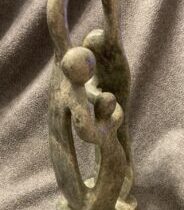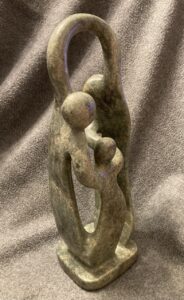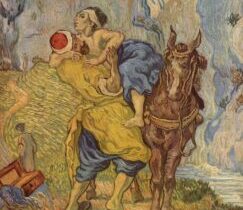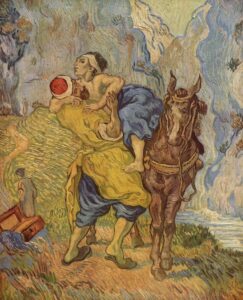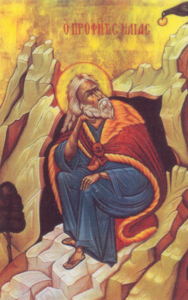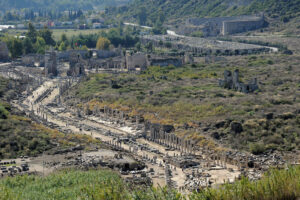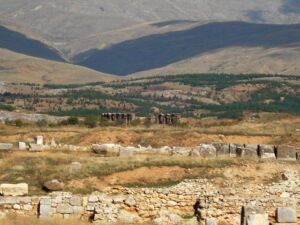You Duped Me, O Lord
 “You duped me, O Lord, and I let myself be duped!” With these words, the prophet Jeremiah expresses a feeling and frustration felt by many at some point in their journey of faith. The word we translate as duped also conveys a sense of seduction, of being betrayed by the one who has coaxed us to love him. A call has been heard. A fire lit within the heart. Words spoken foretelling danger or destruction. And rejection by those who refuse to hear or believe the truth of the call and the warning that burst forth.
“You duped me, O Lord, and I let myself be duped!” With these words, the prophet Jeremiah expresses a feeling and frustration felt by many at some point in their journey of faith. The word we translate as duped also conveys a sense of seduction, of being betrayed by the one who has coaxed us to love him. A call has been heard. A fire lit within the heart. Words spoken foretelling danger or destruction. And rejection by those who refuse to hear or believe the truth of the call and the warning that burst forth.
In the long-ago times when I was a high school student, there was a war going on in Vietnam. It was one of those proxy wars that pitted great powers against each other, but on the surface had nothing to do with their rivalry and was carried out in a small country far from both. Our country was divided between those who supported the war and those who opposed it. The flag and the Pledge of Allegiance had taken on a meaning far beyond that of commitment to the ideals of freedom and democracy. They had come to symbolize for many a complete acceptance of and commitment to the battle against Communism, regardless of the reasons a conflict had originally begun.
In the midst of this discord, my senior class was preparing for graduation. We were taking our last classes, preparing for further education, or for getting a job, or getting married, or for military service. The young men who were not going on to college were quite likely to find themselves drafted into the army and sent to the war. Those who refused to enter the military might find their options limited to leaving the country or going to jail if they couldn’t claim conscientious objector status or arrange alternative service options. It was not an easy, carefree time.
One of my homeroom classmates took a stand against the war. He refused to stand and recite the Pledge of Allegiance to the flag at the beginning of a Student Council meeting. This might not have been a big deal, except he was our representative to the Student Council. Our homeroom teacher explained to all of us what had happened. Our classmate was given a chance to explain why he had refused. Then we were to decide whether to keep him as our representative.
The vote was taken with heads down on the desk, so no one would know who had voted for him to remain and who had voted against him. Only the teacher and the classroom president, yours truly, were to see and count the votes. I don’t remember whether anyone actually voted against his remaining as our representative. I don’t think so. I just remember how proud I was of our class as we voted to support his right to express his beliefs. Not all agreed with him, but we were not willing to deny him that right.
I don’t know what ever happened to him after graduation. I know that the day we graduated, up on the stage, in front of the entire school community, including parents, grandparents, families, and friends, he did not stand up to pledge allegiance to the flag. He was a person of great integrity and I was proud to be his classmate.
The journey of faith is filled with surprise moments. When we first experience the unbounded love of our Father, we swim in the sea of love that envelopes and enfolds us. A love which we breathe in and out as freely as we breathe the air around us. We may notice that some people look askance at us as we speak of God’s love and the wonder of it. But that doesn’t deter us, at least not at first. It’s all so new and amazing and fantastically wonderful.
When the time comes that we find we must make choices that are not popular, we begin to experience the cost of faithfulness to the one who has claimed us and invited us to be his own. Sometimes we can’t have things both ways. We have to make a choice.
Jeremiah had to speak the words of warning to the leaders of his nation and his faith. They were angry with him and repeatedly threatened and punished him. Yet, in his own words, “it becomes like a fire burning in my heart, imprisoned in my bones; I grow weary holding it in, I cannot endure it.” And then he speaks the word of the Lord again. (Jer 20:7-9)
St. Paul advised the Christians of Rome to consider themselves to be “a living sacrifice, holy and pleasing to God.” (Rom 12:1-2) They were not to change themselves to match what was popular in the city at the time. They were to be focused on God’s will and seek to find “what is good and pleasing and perfect.” Life is never perfect. Growth in faith takes place over time. The life of a Christian is to be one of patient, persistent seeking of the good and the will of God.
Jesus also recognized that teaching about God’s mercy and love for all, along with the coming of the kingdom, would not always be accepted or welcomed by the authorities. He explained to his disciples that he needed to go to Jerusalem, not stay out in the countryside preaching and healing folks there. He also warned them that in Jerusalem he would suffer, die, and be raised “on the third day.”
Peter, who just a bit earlier had proclaimed his belief that Jesus was the Christ, took Jesus aside to urge him not to go, not to let such a terrible fate befall him. But Jesus strongly rejected Peter’s advice. “You are thinking not as God does, but as human beings do.”
Jesus went on to explain that those who follow the way he would lead must not think first of their own safety. The most important thing is to accept suffering (the cross) and follow faithfully. “What profit would there be for one to gain the whole world and forfeit his life?” The life in question here is not physical life. It is the deeper life that continues, the life that matters when the Son of Man comes “with his angels in his Father’s glory” to repay all according to the way they lived. (Mt 16:21-17)
“You duped me, O Lord, and I let myself be duped!”
My friend stood up for his beliefs by remaining seated and risked losing his leadership position and the respect of his classmates. Other brave people have taken unpopular stands and paid a high price for it. Paul was beheaded. Peter was crucified. Martin Luther King, Jr. was assassinated. Dorothy Day went to jail. Archbishop Romero was shot as he celebrated Eucharist.
Most of us will never be asked to pay such a price for faithfulness to the Gospel. But each of us will experience times when it’s not comfortable to witness to the truth that we have experienced: the love and mercy of God for all and at all times. We pray that in those moments, we too will speak the word we hear burning in our hearts, boldly and with a courage that admits our fear but speaks and acts in faith.
May we always have the courage to let ourselves be duped and seduced by the love of our God.
Readings for the Twenty-Second Sunday in Ordinary Time – Cycle A
Read More









